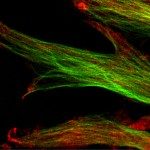Link to Pubmed [PMID] – 9576956
Proc. Natl. Acad. Sci. U.S.A. 1998 May;95(10):5752-6
We describe a bacterial two-hybrid system that allows an easy in vivo screening and selection of functional interactions between two proteins. This genetic test is based on the reconstitution, in an Escherichia coli cya strain, of a signal transduction pathway that takes advantage of the positive control exerted by cAMP. Two putative interacting proteins are genetically fused to two complementary fragments, T25 and T18, that constitute the catalytic domain of Bordetella pertussis adenylate cyclase. Association of the two-hybrid proteins results in functional complementation between T25 and T18 fragments and leads to cAMP synthesis. Cyclic AMP then triggers transcriptional activation of catabolic operons, such as lactose or maltose, that yield a characteristic phenotype. In this genetic test, the involvement of a signaling cascade offers the unique property that association between the hybrid proteins can be spatially separated from the transcriptional activation readout. This permits a versatile design of screening procedures either for ligands that bind to a given “bait,” as in the classical yeast two-hybrid system, or for molecules or mutations that block a given interaction between two proteins of interest.

